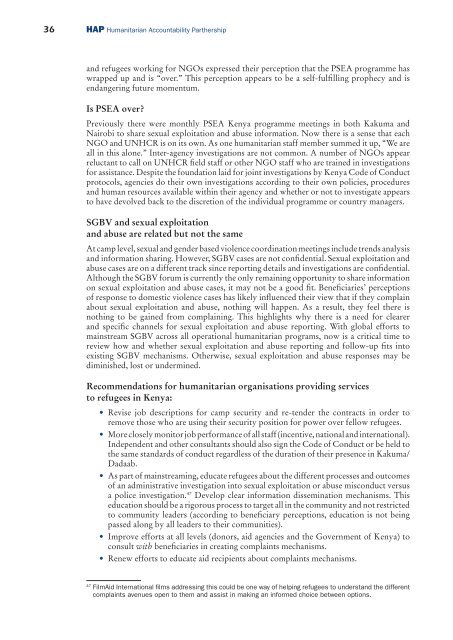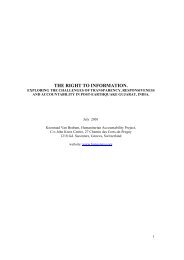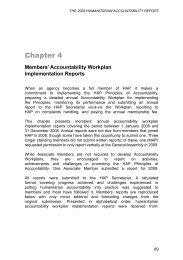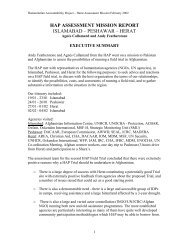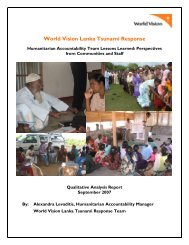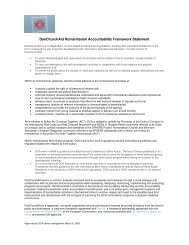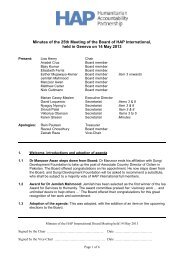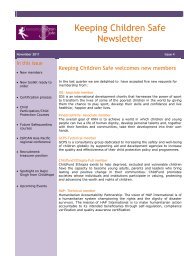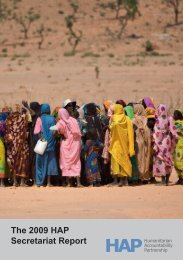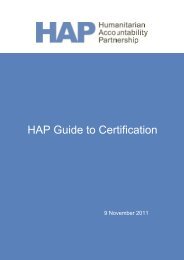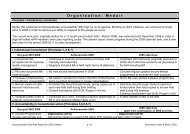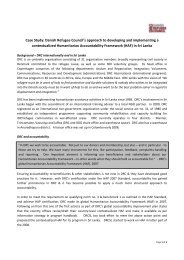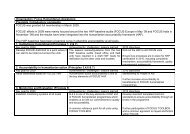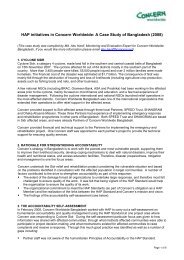TO COMPLAIN OR NOT TO COMPLAIN: STILL THE QUESTION ...
TO COMPLAIN OR NOT TO COMPLAIN: STILL THE QUESTION ...
TO COMPLAIN OR NOT TO COMPLAIN: STILL THE QUESTION ...
Create successful ePaper yourself
Turn your PDF publications into a flip-book with our unique Google optimized e-Paper software.
36 HAP Humanitarian Accountability Parthership<br />
and refugees working for NGOs expressed their perception that the PSEA programme has<br />
wrapped up and is “over.” This perception appears to be a self-fulfilling prophecy and is<br />
endangering future momentum.<br />
Is PSEA over?<br />
Previously there were monthly PSEA Kenya programme meetings in both Kakuma and<br />
Nairobi to share sexual exploitation and abuse information. Now there is a sense that each<br />
NGO and UNHCR is on its own. As one humanitarian staff member summed it up, “We are<br />
all in this alone.” Inter-agency investigations are not common. A number of NGOs appear<br />
reluctant to call on UNHCR field staff or other NGO staff who are trained in investigations<br />
for assistance. Despite the foundation laid for joint investigations by Kenya Code of Conduct<br />
protocols, agencies do their own investigations according to their own policies, procedures<br />
and human resources available within their agency and whether or not to investigate appears<br />
to have devolved back to the discretion of the individual programme or country managers.<br />
SGBV and sexual exploitation<br />
and abuse are related but not the same<br />
At camp level, sexual and gender based violence coordination meetings include trends analysis<br />
and information sharing. However, SGBV cases are not confidential. Sexual exploitation and<br />
abuse cases are on a different track since reporting details and investigations are confidential.<br />
Although the SGBV forum is currently the only remaining opportunity to share information<br />
on sexual exploitation and abuse cases, it may not be a good fit. Beneficiaries’ perceptions<br />
of response to domestic violence cases has likely influenced their view that if they complain<br />
about sexual exploitation and abuse, nothing will happen. As a result, they feel there is<br />
nothing to be gained from complaining. This highlights why there is a need for clearer<br />
and specific channels for sexual exploitation and abuse reporting. With global efforts to<br />
mainstream SGBV across all operational humanitarian programs, now is a critical time to<br />
review how and whether sexual exploitation and abuse reporting and follow-up fits into<br />
existing SGBV mechanisms. Otherwise, sexual exploitation and abuse responses may be<br />
diminished, lost or undermined.<br />
Recommendations for humanitarian organisations providing services<br />
to refugees in Kenya:<br />
• Revise job descriptions for camp security and re-tender the contracts in order to<br />
remove those who are using their security position for power over fellow refugees.<br />
• More closely monitor job performance of all staff (incentive, national and international).<br />
Independent and other consultants should also sign the Code of Conduct or be held to<br />
the same standards of conduct regardless of the duration of their presence in Kakuma/<br />
Dadaab.<br />
• As part of mainstreaming, educate refugees about the different processes and outcomes<br />
of an administrative investigation into sexual exploitation or abuse misconduct versus<br />
a police investigation. 47 Develop clear information dissemination mechanisms. This<br />
education should be a rigorous process to target all in the community and not restricted<br />
to community leaders (according to beneficiary perceptions, education is not being<br />
passed along by all leaders to their communities).<br />
• Improve efforts at all levels (donors, aid agencies and the Government of Kenya) to<br />
consult with beneficiaries in creating complaints mechanisms.<br />
• Renew efforts to educate aid recipients about complaints mechanisms.<br />
47<br />
FilmAid International fi lms addressing this could be one way of helping refugees to understand the different<br />
complaints avenues open to them and assist in making an informed choice between options.


